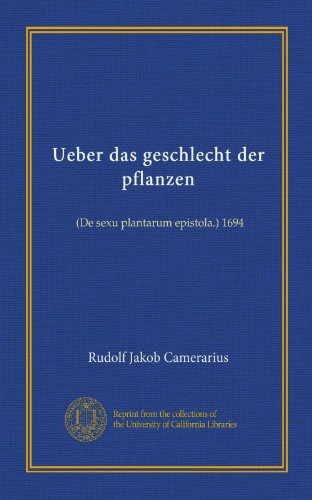Background
Camerarius was born at Tübingen, and became professor of medicine and director of the botanical gardens at Tübingen in 1687.



( This is a reproduction of a book published before 1923....)
This is a reproduction of a book published before 1923. This book may have occasional imperfections such as missing or blurred pages, poor pictures, errant marks, etc. that were either part of the original artifact, or were introduced by the scanning process. We believe this work is culturally important, and despite the imperfections, have elected to bring it back into print as part of our continuing commitment to the preservation of printed works worldwide. We appreciate your understanding of the imperfections in the preservation process, and hope you enjoy this valuable book. ++++ The below data was compiled from various identification fields in the bibliographic record of this title. This data is provided as an additional tool in helping to ensure edition identification: ++++ De Sexu Plantarum Epistola; Volume 105 Of Ostwalds Klassiker Der Exakten Wissenschaften Rudolf Jakob Camerarius W. Engelmann, 1899 Botany; Plants, Sex in
http://www.amazon.com/gp/product/129368046X/?tag=2022091-20

(This book was digitized and reprinted from the collection...)
This book was digitized and reprinted from the collections of the University of California Libraries. It was produced from digital images created through the libraries mass digitization efforts. The digital images were cleaned and prepared for printing through automated processes. Despite the cleaning process, occasional flaws may still be present that were part of the original work itself, or introduced during digitization. This book and hundreds of thousands of others can be found online in the HathiTrust Digital Library at www.hathitrust.org.
http://www.amazon.com/gp/product/B008SKJR6M/?tag=2022091-20
Botanist physician university professor
Camerarius was born at Tübingen, and became professor of medicine and director of the botanical gardens at Tübingen in 1687.
He is chiefly known for his investigations on the reproductive organs of plants (De sexu plantarum epistola (1694)). While other botanists, such as John Ray and Nehemiah Grew, had observed that plants seemed to have sex in some form, and guessed that pollen was the male fertilizing agent, it was Camerarius who did experimental work. In studying the mulberry, he determined that female plants not near to male (staminate) plants produced fruit but with no seeds.
Mercurialis and spinach plants fared likewise.
With the castor oil plant (Ricinus) and with maize he cut off the staminate flowers (the "tassels" of maize), and likewise observed that no seeds formed. His results were reported in the form of a letter (the epistola), and attracted immediate attention, subsequent workers extending his results from the monoecious plants he had studied to dioecious ones as well.
He is chiefly known for his investigations on the reproductive organs of plants (De sexu plantarum epistola (1694)).
(This book was digitized and reprinted from the collection...)
( This is a reproduction of a book published before 1923....)
German Academy of Sciences Leopoldina.
professor
